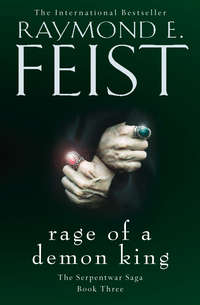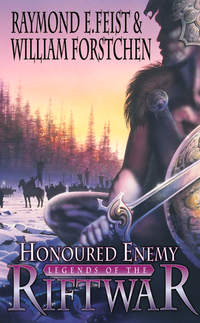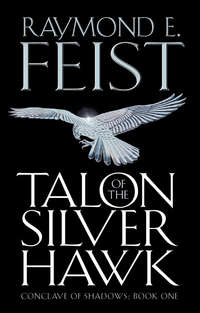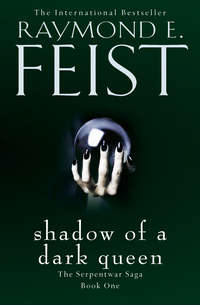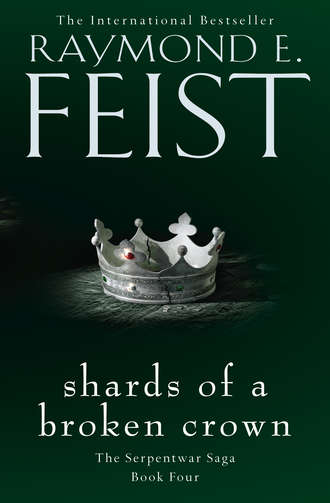
Полная версия
Shards of a Broken Crown
Jimmy shrugged. “We tend to take it for granted.”
“I understand, for you have never known otherwise.” The man looked out over the wall. Below was a sea of tents and makeshift shelters, campfies and the sounds of humanity, laughter, shouts of anger, the voices of peddlers, a child crying. “But to me the notion of something larger than what I can take and hold – for my employer or for myself – that is a wondrous notion.”
The wind blew and the afternoon smelled of salt and charcoal. The man said, “Tell me, why is this city built here?” He glanced westward. “If there is a worse harbor in the world, I’ve not seen it.”
Jimmy shrugged. “The story says the first Prince of Krondor liked the view of the sunset from the hill upon which the palace was built.”
“Princes,” said the man, shaking his head. He sighed loudly. “We are dredging that terrible harbor. We have found those who call themselves ‘Wreckers’ and they are using their magic to raise hulks for us. We manage one every three days, and will have the harbor cleared before next winter.”
Jimmy said nothing.
“We know you marshal what’s left of your fleet down in Shandon Bay, in the village you call Port Vykor. We have no fleet, but we will have ships, and we will hold the city.”
Jimmy shrugged. “May I ask why?”
“Because we have nowhere else to go.”
Jimmy looked at the man and said, “If there was a way back to your home …?”
“There is nothing there.” He glanced toward the east. “There is my future, one way or another.” Then he looked toward the west. “Out there is a land ravaged by over twenty years of war. No city of size remains. Those few that do are small backwaters, barely more prosperous in their glory than Krondor is now in her ashes. They are city-states of tiny men with no sense of the future. One day is much like the next.”
He turned toward Jimmy and studied him a long time. “I’m fifty-two years old next Midsummer’s Day, lad. I’ve been a soldier since I was sixteen years of age. For thirty-six years I’ve been fighting.” He glanced at the city as the sun began to lower in the west. “That’s a damn long time to be dealing in blood and slaughter.” He leaned on the parapet as if tired. “For the last twenty I’ve served demons or black gods, I don’t know which, but I know that the Army of the Emerald Queen was made up of men beguiled by dark forces, lured by promises of wealth, power, and immortality.” His voice lowered. “Or propelled by fear.” He looked down, as if reluctant to look Jimmy in the eyes. “I was ambitious when I was young. I was anxious to make a name for myself. I formed my own company when I was eighteen. I was commanding a thousand men by twenty.
“At first I was glad to serve the Emerald Queen. Her army was the greatest my land had known. With conquest came booty, gold, women, more recruits.” He closed his eyes as if remembering. “But after a while the years slip by and you find the string of women hold no interest, and there’s only so much gold you can carry with you. Besides, there’s nothing to do with it but hire more men.”
He looked at Jimmy and pointed with his thumb over his shoulder, to the north. “My old friend Noradan is up there, at my back. If I know Fadawah, I am to be left here to be ground to a fine dust by the returning army of the Prince of Krondor. I am to slow him down and bleed him, while Noradan builds up a barrier across the highway to the north of here, to stand at Sarth.” He glanced over his shoulder, as if somehow able to see to that distant town. “That’s a hell of a defensive position, that abandoned abbey. Once he’s dug in, it will take your Prince all year to dig him out.”
Looking again at Jimmy, he said, “Meanwhile, Fadawah is going to take your city of LaMut. He won’t go on to Yabon this year, being content to throw up a position south of that city and starve it for a year. He has the means to keep reinforcements and supplies from reaching the city while he repulses your forces from the south.”
Jimmy said, “Why are you telling me this?”
“Spy or not, I want you to carry a message for me to the Prince. I believe he’s still in Darkmoor, but have no doubt he has forces no more than a day’s ride to the east. I’ll arrange an escort to a likely point and turn you loose.”
“Why not just send a message?”
“Because I think you are a spy and I think you’re likely to be believed. If I send one of my own men, or a captive who wasn’t known to the Prince or his men, I think it might take too long to convince him of my intent. And time is a commodity neither of us has.”
Jimmy said, “You’re General Duko.”
The man nodded. “And I’ve been sent out by one of my oldest comrades to die. Fadawah and I have served in various campaigns together since we were hardly old enough to shave. But he fears me, and that’s my death warrant.”
“What do you want me to say to Prince Patrick?”
“I have an offer for him.”
“What’s the offer?”
“I wish to negotiate a settlement of our differences.”
“You’re willing to surrender?”
“Nothing that simple, I’m afraid.” The General smiled a half-smile that Jimmy found both reassuring and unsettling. “Patrick would likely throw me and my men into a camp and get around to shipping us back to Novindus when he found the means, and that could be years down the road.”
“You’re turning coat?”
“Not quite. Surrender or take his gold for service, either way I end up a man looking for a boat back to a land that has no place for me. No, Jimmy, I need a different solution. I need a future, for me and my men.”
“What do you wish me to tell the Prince’s men?”
“Tell them that I have handpicked the men with me here in Krondor. Tell them those I had reservations about were left behind with Noradan. I can vouch for my men.” He looked into Jimmy’s eyes a moment. “Tell your Prince of Krondor I will swear fealty to the crown, in exchange for land and titles. Grant me estates and income, and I will lead the army north to visit with my old friends Noradan and Fadawah.”
Jimmy was silent for a moment. He was both astonished at the suggestion and amazed at the logic behind it. He shook his head. “I don’t know what he will say.”
“If we knew what he would say, we wouldn’t have to send you, now, would we?”
Jimmy shook his head.
“Come, get something to eat, and leave at first light.” He led Jimmy down the stairs.
Jimmy watched the man’s back and considered what he wanted. In a single breath he had set a price: forgive the assault on the Western Realm, and more, grant the man a patent of nobility, name him Earl or Baron of some lands in the West, and give him the power to rule over those lands. Jimmy shook his head. Would Patrick do it, or would his temper doom men on both sides of the wall to more useless bloodshed?
Dash sipped at the watery soup and said, “So then what?”
“We stayed in that basement a week or more. Hard to judge being in the gloom all that time.” The old man motioned to put aside his bowl, held in a badly deformed hand, and the young woman moved to take it before it fell to the floor. “Thank you, Trina,” he said.
His voice was as scarred as his face, but after getting used to the sound of it, Dash understood him well enough.
The three men who had come with Dash were still missing, and only Dash, the old man, and the woman thief sat around the simple wooden table.
“What should I call you?” asked Dash.
“Your grandfather insisted on calling me Lysle. It was a name I hadn’t used in more score of years than I can count, but it serves. I’ve had so many in my life I barely know which one is truly mine.”
“Lysle, you were telling me about Grandfather and Grandmother.”
“James set fire to the oil he rigged in the sewers. We knew it would be a close thing and it was. I was in the escape tunnel ahead of them, and when the explosion came I shot from the mouth of the tunnel like a cork from a bottle of sparkling wine. I was badly burned, as you see, and had half my bones broken, but I’m a tough nut.”
The woman named Trina spoke. “And we found a healing priest who worked on him.”
“Damn near killed the man, making him do his healings over me, my merry band of cutthroats did. But they saved me before the poor brother of Killian passed out from exhaustion. He squeezed a few years more of life for me, while I set matters in Krondor right.”
“Grandfather and Grandmother?”
The old man shook his head. “James and Gamina were last in the tunnel, behind me. They never had a chance, boy.”
Dash had known his grandfather and grandmother were dead; his great-grandfather Pug had said so, but upon finding the Upright Man alive, a faint hope had been rekindled in Dash. Now it was extinguished again, and the pain was again felt.
Lysle said, “If it is any comfort, I know they died quickly, and together.”
Dash nodded. “Grandmother would never have wanted to live without Grandfather.”
“I never knew my brother well, Dash. We had met once as young men, and then again a few years ago.” The old man laughed, a dry chuckle. “He put me out of business, actually, and damn near got me killed by some of the more ambitious men in the Mockers.
“But those few days I spent with him and your grandmother, they were my chance to hear the stories. I’m sure you heard most of them. Prince Arutha and the journey to Moraline, the fall of Armengar, where he got the idea for that nasty fire trap that got himself killed. I heard how he had journeyed to Kesh, during that matter with the Crawler, and when Lord Nirome had tried to depose the Empress. He told me of his rise in power and the time he spent ruling in Rillanon.
“I had thought myself something of a man of some accomplishments. When my father had died, one of his most trusted lieutenants had seized control of the Mockers, naming himself the Virtuous Man. I in turn deposed him and called myself the Sagacious Man. And I returned to the name Upright Man to signal an agreement I had with your grandfather and create the false impression I had deposed myself with the members of the Mockers.
“But my accomplishments pale next to those of Jimmy the Hand. The thief who ruled in turn the two mightiest cities in the Kingdom. He who was the most powerful noble in the nation. What a man he was.”
Dash nodded. “When you put it that way, I see what you mean. To me he was Grandfather, and he had lots of wonderful stories. I sometimes forgot they were true.”
The Upright Man said, “Now, the question is, what to do with you?”
“Me?”
“You’re here spying for your father. That’s not a problem, in and of itself, but the fact is you’ve seen me, talked to me, and letting you go is a problem.”
“Would it make a difference if I swore to say nothing about you to anyone?”
The old man laughed his dry chuckle again. “Hardly. You’re who you are, boy, and things might remain on the square between us for a while, but eventually, when things return to something like before around here, the day will come when some Mocker will create a problem that will call a little too much attention to us. It happens from time to time. And then you’ll find yourself wondering just where your loyalties lie, to your Prince or your old Uncle Lysle. Considering our deep family bond, I have no doubt you’d turn me in the first chance you get.”
Dash stood up. “Grandfather taught me better.” He glanced at the girl, and then at his great-uncle. “Besides, the Mockers I’ve seen don’t exactly look a menace to the sovereignty of the nation at the moment, and then there’s the small matter that we don’t presently control Krondor.”
“That’s a matter of some weight, true. And it gives me pause about ordering your death. You don’t presently pose a threat. What do you think you can manage for us if we help you get free and back to your father?”
Dash said, “I can’t promise anything. I don’t have the authority. But I suspect with a little conversation, I can get Father to authorize a general pardon for any of your people who help us retake the city.”
“A little fighting for an amnesty?”
“Something like that. Having a few of you inside the walls at key locations at the right time could save a lot of lives under the walls.”
“Well, let me think on this, and then I’ll tell you what I’ll do tomorrow. Get some rest and don’t try to escape.”
“What of my friends?”
“They’re being cared for. I don’t know how important they are to you, but I’m counting on them having a little call on your loyalties, so I can keep you in line.”
Dash nodded and the old man hobbled to the door. “Trina will keep you company for the night.” Dash tried to look pleased, but the woman’s dark glare made it clear amusing byplay would be lost on her.
After the door closed, Dash sat down on a pile of straw in the corner, obviously his bed for the night. A long moment of silence passed as Trina sat on the chair by the table watching him. Looking at his guard, he said, “Well, then. Do we tell one another our life stories?”
Taking out her dagger, the woman began to clean her fingernails with the point. She put her feet up on the table and said, “No, Puppy. We do not.”
Sighing, Dash lay down and closed his eyes.
• Chapter Six • Choices
NAKOR FROWNED.
He scanned the room of the warehouse in Darkmoor he was currently using as a base of operations, and said, “This will not do.”
Sho Pi, his first disciple, said, “What, master?”
Since becoming self-appointed head of the Church of Arch-Indar, Nakor had ceased objecting to being referred to as “master” by the young former monk of Dala. Nakor pointed to the wagon that was being unloaded outside his new “church,” and said, “We ordered twice that.”
“I know,” shouted the driver of the second wagon as it pulled up. “Hello, Nakor.”
“Hello, Roo!” shouted the former gambler turned high priest. “Where is the rest of our grain?”
“This is all there is, my friend,” said Rupert Avery, once the richest man in the history of the Western Realm, now the proud owner of three wagons, three teams of horses, and an amazing debt owed him by a near-bankrupt Kingdom. “Most of what I can buy goes to the Prince, to feed the soldiers.”
“But I have gold,” said Nakor.
“For which I am eternally grateful, for without your patronage, I would be unable to buy even the meanest grain out there. My credit is overextended in the East, I am forced to sell my holdings there to pay off my debts, and the money that’s owed me is coming from a presently nonexistent Western Realm.”
“You seem unusually happy for a man in such dire straits,” observed Nakor.
“Karli is going to have another baby.”
Nakor laughed. “I thought you were put off by children.”
Roo smiled, his narrow face showing an almost boyish aspect as he nodded. “Once I was, but when we fled Krondor and reached Darkmoor, well, that time cooped up with them almost every day, I came to learn a great deal about my children.” His smile faded and he said, “About myself, as well.”
“Learning about one’s self is always a good thing,” observed Nakor. “After you unload, come inside and I’ll make us some tea.”
“You have tea?” asked Roo. “Where did you get it?”
“A gift from a woman who had hidden it from before the war. It is not very fresh, I’m afraid, but it is tea.”
“Good, I’ll join you when I’m done here.”
Nakor went inside the building, where another disciple was overseeing a class of students, five this time, listening to the introductory lesson on the role of good in the universe. Nakor realized that most, if not all, were there for the meager food his church provided after the lecture, but he was always hopeful someone would answer the call. So far he had recruited five new students, for a total of six counting Sho Pi. Given he had unilaterally decided to create a church for one of the four greatest Gods in the Midkemian universe, it was a very modest beginning.
“Any questions?” asked the disciple, who had himself heard the lecture for the first time only a few weeks before.
Four of the students looked back with expressions showing limited comprehension, but one tentatively raised her hand.
“Yes?” asked the disciple.
“Why are you doing this?”
“Why am I doing what?” said the disciple.
Nakor stopped and listened.
“Not you, all of you. Why are you preaching this message of good?”
The disciple looked at Nakor with near panic on his face. He had never been asked anything so basic, and the simplicity of the question was confounding him.
Nakor grinned. “I’ll answer, but first I must know, why do you ask?”
The girl shrugged. “Most who preach are servants of one of the common gods, looking for something. You seem to be asking for nothing, and I wish to know what is the catch?”
Nakor grinned. “Ah, a cynic! How wonderful. You, come with me. The rest of you, wait here and you’ll eat.”
The girl rose and followed.
Nakor turned as he led her into what had once been a shipping office and now served as his personal quarters. A half-dozen sleeping mats were strewn across the floor, and a small brazier heated a pot of water. “What is your name, girl?”
“Aleta,” answered the young woman. “Why?”
“Because you interest me.”
The girl looked Nakor up and down frankly, and said, “Well, priest, you don’t interest me if you’re looking for a companion.”
Nakor laughed. “That’s funny. No, you interest me because you’re curious.” He poured tea and handed her a small cup. “It’s not very good, but it’s hot.”
She sipped at it and said, “I agree. It is not very good.”
“Now, about your question. I will answer you if you tell me what brought you here.”
“I worked at an inn to the west of here before the war. It is now ashes. I almost starved during the winter. I have managed to stay alive without having to spread my legs or kill anyone, but I’m hungry, and your monk said there’s to be food.”
“A frank answer. Good. There will be food,” said Nakor. “As to why we do this, let me ask you a question. What is the nature of good and evil?”
The girl blinked, and Nakor studied her as she framed her reply. She appeared to be in her middle twenties. She had a plain face, with wide-set eyes that made her appear to be as curious as her questions showed her to be, and her nose was straight. Her mouth was full, and her chin was strong, and the entire effect was more attractive than not, Nakor decided. She wore a heavy cloak over her dress, but Nakor had glimpsed enough of her as she had crossed the former warehouse to judge her slender, perhaps even wiry.
At last she said, “Good and evil are natures. They have no nature. They are what they are.”
“Absolute?”
“What do you mean?”
“I mean do good and evil exist in some absolute sense?”
“I suppose so,” said the girl. “I mean, I think men do what they do and sometimes it’s good and sometimes it’s evil, and sometimes I’m not sure, but out there, somewhere, good and evil exist, I guess.”
“Good guess,” said Nakor, smiling. “How would you like to stay with us?”
“That depends,” she said, skepticism clearly evident. “For what purpose?”
“I need smart men and women. I need people who realize that what we’re doing is important, without taking themselves too importantly.”
Suddenly the girl laughed. “I’ve never taken myself very seriously.”
“Good, neither have I.”
“What is it you’re doing?”
Nakor’s manner and voice turned serious. “Out there are forces beyond your understanding. Beyond mine, too.” He grinned, then returned to a serious demeanor. “Many of those qualities many people think of as being ‘abstractions’ are truly objective entities. Do you understand me?”
The girl shook her head. “I have no idea what you just said.”
Nakor laughed. “Very good. You are honest. Let me put it another way. The Good Goddess is sleeping. She is in a trance caused by evil forces. To awaken her we must do good in her name. If enough of us work on her behalf, she will return to us and evil will be driven back into the shadows where it belongs.”
“I understand that,” said Aleta.
“You don’t believe it.”
The former barmaid said, “I don’t know. I’ve never been much of one for gods and goddesses. But if it will fill my stomach, I’m willing to believe for a while.”
“Fair enough.” Nakor rose as Roo came into the office. “We’ll feed you for as long as you wish to stay here, and you’ll learn to do good in the Lady’s name.”
The girl departed and Roo said, “Another convert?”
“Perhaps,” said Nakor. “Potentially. She’s brighter than most.”
Roo said, “Attractive, too, in a funny way. Not pretty, but attractive.”
Nakor grinned. “I know.”
Roo sat and Nakor offered him a cup of tea. “Sorry the order is short, but everyone is being shorted right now. I just finished a shouting match with Prince Patrick’s quartermaster. The army is ready to march, but they lack stores and I can’t promise as much as I’ve already brought from the East, let alone what they want.” He sipped at the hot liquid and said, “Not good, but it’ll do.” Putting the cup down, he continued, “I can’t even find wagons. I could bring more if I could get wagons, but most of the cartwrights in Salador are building for the army. If Patrick would convince the King to let me have his wagons, I could deliver them stocked with goods, but they’re bringing more equipment – arms, saddles, blankets, and the like.”
Nakor nodded. “You need to get your businesses here back up and running.”
Roo laughed. “If only I could.”
“What about building wagons here?”
“No cartwrights. I know a little about keeping them – I was raised a teamster, after all – but not about building one. I know a little carpentry, but I don’t know the metal work, and turning a wheel is a special skill.”
Nakor said, “If I can find you some cartwrights, would you do something for me?”
“What?”
“A favor.”
Roo smiled. His narrow face showed his own wry sense of humor coming to the surface. “You’re setting me up, aren’t you?”
Nakor laughed. “Never trick a trickster.”
“What is it?”
“If I can get you six cartwrights, I want you to commission a statue to be made for me.”
“A statue? What for?”
“I’ll tell you after I get the men. Will you do it?”
A calculating look crossed Roo’s face, and he said, “Make it six cartwrights, a master smith, and three lumbermen, and I’ll commission two statues.”
“Done,” said Nakor, slapping the table with his hand. “I’ll have them for you tomorrow. Where should I send them?”
“I converted a warehouse outside the city to an office here in Darkmoor. I’ll use it as a base until I can return to Krondor. Go out the eastern gate, and at the first road, turn left. It’s the large green warehouse on the right. You can’t miss it.”
Nakor said, “I’ll find it.”
“There’s something about that girl,” said Roo, indicating where Aleta had gone. “I can’t quite put my finger on what it is.”
“She’s someone important I think.”
Roo laughed. “As long as I’ve known you I’ve never pretended to understand you.”
“That’s as it should be,” replied Nakor. “For I have never understood myself.”
“Can I ask you something, as a friend?”
“Of course.”
“Over the years you’ve claimed you only know tricks, yet you manage the damnedest things that I can only call magic. Now you’re starting a religion. Now, my question is, what are you really up to?”
Nakor grinned. “I’m starting something important. I’m not sure how it will turn out, and I doubt if I’ll be around to see it at the end, but I’m doing something that may be the most important thing I’ve done in my life.”
“And may I ask what that is?”
Nakor used his hand to indicate the poor building in which they sat. “I’m building a church.”
Roo shook his head. “If you say so. Tell me, Nakor, has anyone ever called you mad?”


